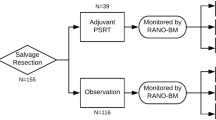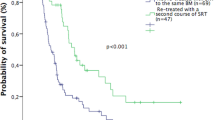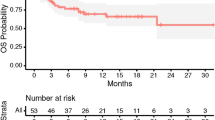Abstract
The aim of the present study was to evaluate the efficacy and limitations of repeat stereotactic radiosurgery (SRS) salvage for patients with recurrence of brain metastases (BM) after whole brain radiotherapy (WBRT). This is a retrospective, observational, single-center trial analyzing 77 consecutive patients with recurrent BM who were treated primarily with WBRT. All patients underwent SRS as salvage treatment. Median age was 62 years, and median Karnofsky performance status (KPS) was 80. The median interval between the starting date of WBRT and radiosurgery was 10.6 months. One, two and more than two SRS sessions were required in 42, 13 and 22 patients, respectively. The median total planning target volume (PTV) was 8.1 mL and the median dose prescribed was 20 Gy. The median follow-up was 7.7 months. 1- and 2-year neurological death-free survival (NS) rates were 87 and 78 %, respectively. Competing risk analysis demonstrated active extra-central nervous system (CNS) disease [Hazard ratio (HR) 0.236, P = 0.041] and total PTV on initial SRS (≥5 mL) (HR 4.22, P = 0.033) to be associated with the NS rate. 1- and 2-year overall survival (OS) rates were 41 and 11 %, respectively. The median OS time was 8.2 months. Active extra-CNS disease (HR 1.94, P = 0.034) and high KPS (≥90) (HR 0.409, P = 0.006) were associated with the OS rate. In total, 798 tumors (75 %) in 66 patients (86 %) with sufficient radiological follow-up data were evaluated. 1- and 2-year metastasis local control rates were 76.6 and 57.9 %, respectively. Prescribed dose (≥20 Gy) (HR 0.326, P < 0.001), tumor volume (≥2 mL) (HR 1.98, P = 0.007) and metastases from breast cancer (HR 0.435, P < 0.001) were independent predictive factors for local tumor control. Repeat salvage SRS for recurrent BM after WBRT appeared to be a safe and effective treatment. In the majority of patients, even those with numerous BM, neurological death could be delayed or even prevented.

Similar content being viewed by others
References
Sadikov E, Bezjak A, Yi QL, Wells W, Dawson L, Millar BA, Laperriere N (2007) Value of whole brain re-irradiation for brain metastases—single centre experience. Clin Oncol (R Coll Radiol) 19:532–538
Son CH, Jimenez R, Niemierko A, Loeffler JS, Oh KS, Shih HA (2012) Outcomes after whole brain reirradiation in patients with brain metastases. Int J Radiat Oncol Biol Phys 82:e167–e172
Wong WW, Schild SE, Sawyer TE, Shaw EG (1996) Analysis of outcome in patients reirradiated for brain metastases. Int J Radiat Oncol Biol Phys 34:585–590
Maranzano E, Trippa F, Casale M, Costantini S, Anselmo P, Carletti S, Principi M, Caserta C, Loreti F, Giorgi C (2012) Reirradiation of brain metastases with radiosurgery. Radiother Oncol 102:192–197
Noel G, Proudhom MA, Valery CA, Cornu P, Boisserie G, Hasboun D, Simon JM, Feuvret L, Duffau H, Tep B, Delattre JY, Marsault C, Philippon J, Fohanno D, Baillet F, Mazeron JJ (2001) Radiosurgery for re-irradiation of brain metastasis: results in 54 patients. Radiother Oncol 60:61–67
Caballero JA, Sneed PK, Lamborn KR, Ma L, Denduluri S, Nakamura JL, Barani IJ, McDermott MW (2012) Prognostic factors for survival in patients treated with stereotactic radiosurgery for recurrent brain metastases after prior whole brain radiotherapy. Int J Radiat Oncol Biol Phys 83:303–309
Chao ST, Barnett GH, Vogelbaum MA, Angelov L, Weil RJ, Neyman G, Reuther AM, Suh JH (2008) Salvage stereotactic radiosurgery effectively treats recurrences from whole-brain radiation therapy. Cancer 113:2198–2204
Yomo S, Hayashi M, Nicholson C (2012) A prospective pilot study of two-session Gamma Knife surgery for large metastatic brain tumors. J Neurooncol 109:159–165
Kano H, Kondziolka D, Lobato-Polo J, Zorro O, Flickinger JC, Lunsford LD (2010) T1/T2 matching to differentiate tumor growth from radiation effects after stereotactic radiosurgery. Neurosurgery 66:486–491; discussion 491–482
Terakawa Y, Tsuyuguchi N, Iwai Y, Yamanaka K, Higashiyama S, Takami T, Ohata K (2008) Diagnostic accuracy of 11C-methionine PET for differentiation of recurrent brain tumors from radiation necrosis after radiotherapy. J Nucl Med 49:694–699
Gray RJ (1988) A class of K-sample tests for comparing the cumulative incidence of a competing risk. Ann Stat 16:1141–1154
Fine JP, Gray RJ (1999) A proportional hazards model for the subdistribution of a competing risk. J Am Stat Assoc 94:496–509
Papadatos-Pastos D, Banerji U (2011) Revisiting the role of molecular targeted therapies in patients with brain metastases. J Neurooncol 105:467–474
Caffo M, Barresi V, Caruso G, Cutugno M, La Fata G, Venza M, Alafaci C, Tomasello F (2013) Innovative therapeutic strategies in the treatment of brain metastases. Int J Mol Sci 14:2135–2174
Ammirati M, Cobbs CS, Linskey ME, Paleologos NA, Ryken TC, Burri SH, Asher AL, Loeffler JS, Robinson PD, Andrews DW, Gaspar LE, Kondziolka D, McDermott M, Mehta MP, Mikkelsen T, Olson JJ, Patchell RA, Kalkanis SN (2010) The role of retreatment in the management of recurrent/progressive brain metastases: a systematic review and evidence-based clinical practice guideline. J Neurooncol 96:85–96
Cooper JS, Steinfeld AD, Lerch IA (1990) Cerebral metastases: value of reirradiation in selected patients. Radiology 174:883–885
Abdel-Wahab MM, Wolfson AH, Raub W, Landy H, Feun L, Sridhar K, Brandon AH, Mahmood S, Markoe AM (1997) The role of hyperfractionated re-irradiation in metastatic brain disease: a single institutional trial. Am J Clin Oncol 20:158–160
Soffietti R, Kocher M, Abacioglu UM, Villa S, Fauchon F, Baumert BG, Fariselli L, Tzuk-Shina T, Kortmann RD, Carrie C, Ben Hassel M, Kouri M, Valeinis E, van den Berge D, Mueller RP, Tridello G, Collette L, Bottomley A (2013) A European Organisation for Research and Treatment of Cancer phase III trial of adjuvant whole-brain radiotherapy versus observation in patients with one to three brain metastases from solid tumors after surgical resection or radiosurgery: quality-of-life results. J Clin Oncol 31:65–72
Chang EL, Wefel JS, Hess KR, Allen PK, Lang FF, Kornguth DG, Arbuckle RB, Swint JM, Shiu AS, Maor MH, Meyers CA (2009) Neurocognition in patients with brain metastases treated with radiosurgery or radiosurgery plus whole-brain irradiation: a randomised controlled trial. Lancet Oncol 10:1037–1044
Davey P, O’Brien PF, Schwartz ML, Cooper PW (1994) A phase I/II study of salvage radiosurgery in the treatment of recurrent brain metastases. Br J Neurosurg 8:717–723
Yang CC, Ting J, Wu X, Markoe A (1998) Dose volume histogram analysis of the gamma knife radiosurgery treating twenty-five metastatic intracranial tumors. Stereotact Funct Neurosurg 70(Suppl 1):41–49
Yamamoto M, Ide M, Nishio S, Urakawa Y (2002) Gamma Knife radiosurgery for numerous brain metastases: is this a safe treatment? Int J Radiat Oncol Biol Phys 53:1279–1283
Hazuka MB, Kinzie JJ (1988) Brain metastases: results and effects of re-irradiation. Int J Radiat Oncol Biol Phys 15:433–437
Kurup P, Reddy S, Hendrickson FR (1980) Results of re-irradiation for cerebral metastases. Cancer 46:2587–2589
Acknowledgments
We are grateful to Bierta Barfod, M.D., M.P.H. for her help with the preparation of this manuscript.
Conflict of interest
The authors have no personal, financial or institutional interests in any of the materials or devices described in this article.
Author information
Authors and Affiliations
Corresponding author
Rights and permissions
About this article
Cite this article
Yomo, S., Hayashi, M. The efficacy and limitations of stereotactic radiosurgery as a salvage treatment after failed whole brain radiotherapy for brain metastases. J Neurooncol 113, 459–465 (2013). https://doi.org/10.1007/s11060-013-1138-y
Received:
Accepted:
Published:
Issue Date:
DOI: https://doi.org/10.1007/s11060-013-1138-y




